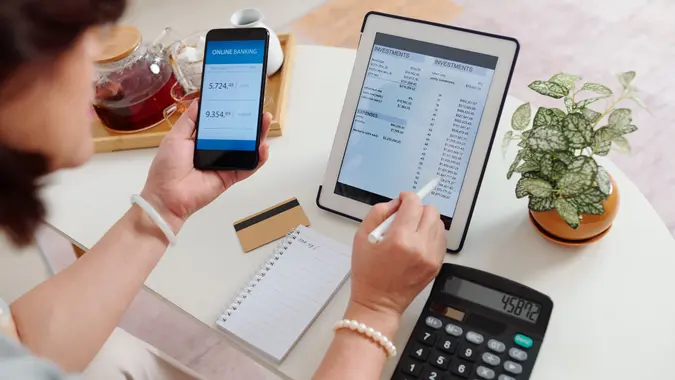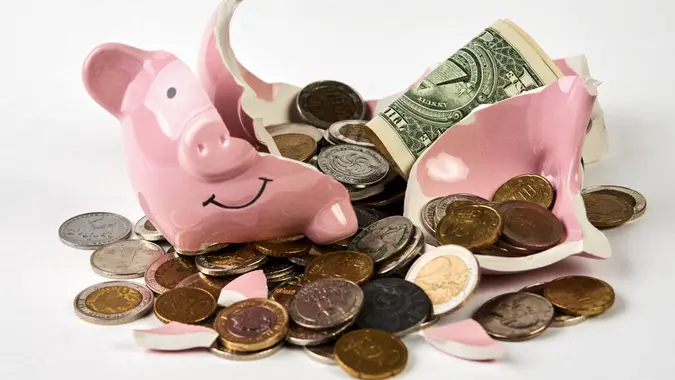4 Key Signs Your Banking Habits Are Leaving Money on the Table

Commitment to Our Readers
GOBankingRates' editorial team is committed to bringing you unbiased reviews and information. We use data-driven methodologies to evaluate financial products and services - our reviews and ratings are not influenced by advertisers. You can read more about our editorial guidelines and our products and services review methodology.

20 Years
Helping You Live Richer

Reviewed
by Experts

Trusted by
Millions of Readers
Building wealth means building good financial habits, like budgeting and paying your bills on time. But what about the things that affect your money behind the scenes? Are you sure you’re accounting for every penny and avoiding leaving money on the table, or there a disconnect?
If there is, it’s usually easy to pinpoint where it begins: your bank. It’s an old saying, but if you picture it quite literally — closing the door behind you with heaps of cash left on the table — the reality of not being on top of your finances hits hard.
To help you identify your best banking habits, GOBankingRates connected with two experts: Sumeet Grover, executive vice president at Alliant Credit Union, and John Jordan, head of retail banking at Regions Bank. According to them, here are some key signs you have room to improve.
You’re Hoarding Money in Your Checking Account
At first glance, a flush checking account may seem like a sign of wealth, especially if you struggled in your younger years. However, keeping all your money in a checking account means you’re missing out on opportunities to grow your funds through interest.
“For starters, if you have more than a couple of months’ worth of living expenses in your checking account, you might be missing out on higher interest rates available in savings accounts or other investments,” said Grover. “Regular savings accounts often offer very low interest rates. Switching to a high-yield savings account can significantly increase your earnings on your savings.”
You’re Paying Unnecessary Fees
Monthly fees might seem like minor inconveniences, but they can add up quickly. Grover advised that you monitor the fees you incur, such as maintenance fees, ATM surcharges, and overdraft charges.
You should also look for accounts that offer fee waivers or reimbursements. Paying attention to fine print and choosing a fee-free bank account — or one that waives fees if you meet certain requirements, like direct deposit — can save you hundreds of dollars annually.
You’re Not Using a Card With Rewards
Beyond reducing fees, you should also be on the lookout for ways to earn rewards from your everyday spending.
“If you’re not using a credit card offering cash back or other rewards, you could miss out on valuable benefits,” said Grover. “By addressing these habits, you can make your money work harder for you and avoid leaving money on the table.”
Check your current credit card benefits and see if it would make sense to switch to one that aligns better with your spending habits to get the most rewards while avoiding high annual fees.
You’re Not Creating a Financial Plan
Monitoring these habits should be part of a broader financial plan that prioritizes long-term success. According to Jordan, one of the biggest mistakes you can make is procrastinating on developing that plan and putting your money as a top priority.
He’s observed that this delay can sometimes have a gendered aspect, with women disproportionately putting everyone else’s needs — whether work, household management, or caregiving responsibilities — ahead of their own financial well-being.
Still, Jordan reminds us that “time is money.” He warns that every day a woman doesn’t attend to her own finances, she could be losing out on the chance to take advantage of a rising market.
“Do not delay conversations to roll over workplace 401(k)s, optimize bank deposit pricing, or consolidate debt,” he said.
 Written by
Written by  Edited by
Edited by 

























